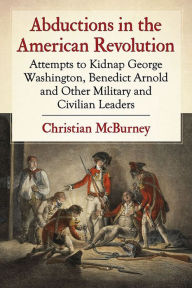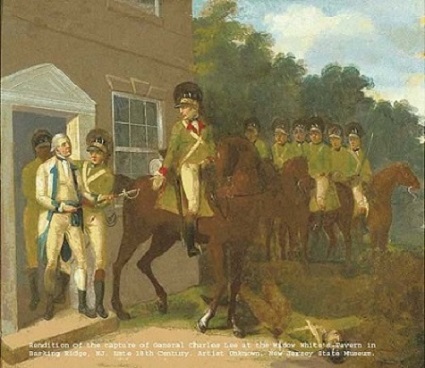Presentation Date: November 21, 2016
George Washington called such efforts “honorable” and supported attempts to kidnap the British commander-in-chief (twice), Benedict Arnold (after he turned traitor), and Prince William Henry (a future king of Great Britain). Of course the British did target Washington at his Morristown NJ winter headquarters by British dragoons who crossed the frozen Hudson River.among other military and civilian leaders of the United States.
Join us on Monday, November 21st as we welcome back Christian McBurney who will talk about his new book “Abductions in the American Revolution“. A short business meeting will start around 7:15pm. The presentation will start at 7:30pm. MaGreks Pub and Grill will be running a 1/2 price special on burgers that night. We encourage you to join our membership for the very small and reasonable tax deductible amount of $20. If you join before December 2016, you only pay $15 in celebration of our 15 year anniversary.
Christian was raised in Kingston, Rhode Island in a home built in 1809. In high school, he wrote a book on the history of Kingston, which was not a bad effort for a teenager! He graduated from  South Kingstown High School in 1977 and from Brown University in 1981. At Brown, he wrote a 300-page undergraduate history thesis on colonial South Kingstown planter society. After graduating from New York University School of Law in 1985, he embarked on a career as an attorney. Currently, he is a partner with the law firm of Arent Fox LLP. He live with my wife, Margaret, in Kensington, Maryland, where they have raised three wonderful children, Ryan, Kyle and Victoria. He has renewed his interest in history writing by writing the adult version of the history of Kingston, which was published in 2004. Please go to http://christianmcburney.com/ to learn more about Christian McBurney.
South Kingstown High School in 1977 and from Brown University in 1981. At Brown, he wrote a 300-page undergraduate history thesis on colonial South Kingstown planter society. After graduating from New York University School of Law in 1985, he embarked on a career as an attorney. Currently, he is a partner with the law firm of Arent Fox LLP. He live with my wife, Margaret, in Kensington, Maryland, where they have raised three wonderful children, Ryan, Kyle and Victoria. He has renewed his interest in history writing by writing the adult version of the history of Kingston, which was published in 2004. Please go to http://christianmcburney.com/ to learn more about Christian McBurney.
The tactic of kidnapping enemy leaders, used in recent wars in Iraq and Afghanistan, dates to the American Revolution. New Jersey governor William Livingston performed a patriotic service by going to considerable lengths to avoid numerous abduction attempts.
 Sometimes these operations succeeded, as with the spectacular captures of Continental Army Major General Charles Lee, British Army Major General Richard Prescott, Connecticut’s Brigadier General Gold Selleck Silliman, Massachusetts’s Brigadier General Peleg Wadsworth, and North Carolina’s Governor Thomas Burke. Sometimes they barely failed, as with the violent attempt by British secret service operatives against Major General Philip Schuyler, the mission by British dragoons against Thomas Jefferson at Monticello, and even John Champe’s plan to nab Benedict Arnold in New York City.
Sometimes these operations succeeded, as with the spectacular captures of Continental Army Major General Charles Lee, British Army Major General Richard Prescott, Connecticut’s Brigadier General Gold Selleck Silliman, Massachusetts’s Brigadier General Peleg Wadsworth, and North Carolina’s Governor Thomas Burke. Sometimes they barely failed, as with the violent attempt by British secret service operatives against Major General Philip Schuyler, the mission by British dragoons against Thomas Jefferson at Monticello, and even John Champe’s plan to nab Benedict Arnold in New York City.
Some of the abducted, such as signer of the Declaration of Independence Richard Stockton and Delaware’s Governor John McKinly, suffered damage to their reputations. The kidnapper risked all—if caught, he could be hanged—and some were, including Isaac Hayne in South Carolina, William Riddle in North Carolina, and Joseph Bettys in upstate New York.
This book covers more than thirty major attempted and successful abductions of military and civilian leaders from 1775 to 1783, from Maine to Georgia, and including two in Great Britain.
